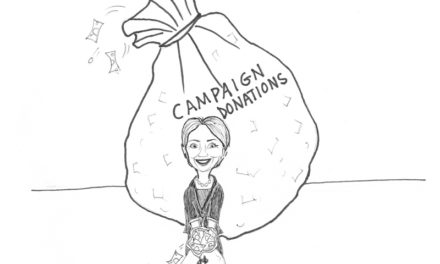Pussy Riot, a feminist punk-rock band made up of twelve anonymous members based in Moscow, Russia, has gotten a lot of world-wide recognition due to their “unorthodox” lyrics and “outspoken” political protests that speak against Russian president Vladimir Putin and general governmental policies that are deemed as patriarchal.
Here is just a sample (translated from Russian) of the lyrics that they sing:
“The head of the KGB, their chief saint,
Leads protesters to prison under escort,
In order not to offend His Holiness,
Women must give birth and love
Shit, shit, the Lord’s shit!
Shit, shit, the Lord’s shit!”
In early March, three members of the group, Nadezhda Tolokonnikova, Maria Alyokhina, and Yekaterina Samutsevick were arrested for the performance of their song “Punk Prayer” in Moscow’s main cathedral.
They were then tried in July under the Russian court for their acts of “hooliganism” (whatever that means). The three women were denied appeal and were just recently sentenced to two years in prison, a sentence Putin (and others in Russia) fervently supports.
Many American musicians including The Red Hot Chilli Peppers and Madonna have shown their support for the feminist group and even though the three members have been convicted, music videos continue to be released by other anonymous members of Pussy Riot.
The heart of this article is about whether or not Pussy Riot deserves their sentence.
I would have to say, with absolutely no question, that these three members of Pussy Riot should be liberated. All they have done is speak out against a regime that relies heavily on the dogmatism of Christianity and the discrimination against women.
Putin is using their jail sentence as a way to subtly undermine feminism as a whole. This issue transcends why they are in jail and extends to the Feminist movement as a whole.
I understand, logistically speaking, why the women were arrested, I just don’t understand why they were kept captive and then sentenced to two years in prison. I think the issue lies within the underlying ideology of modern Russian society.
The society in which these Russian women live in has almost forced them to go to these extreme lengths to liberate themselves.
The ironic thing is that Putin doesn’t realize that the kind of world- wide support they are getting is actually a win for this feminist group and Feminism as a global movement. Pussy Riot, especially the sentence of the three women listed above, has created a giant international uproar.
Even human rights group Amnesty International has decided to back Pussy Riot. Not only that but Yoko Ono has said to be giving the LennonOno Grant for Peace to these feminists for their public protesting.
Internationally speaking, other nations agree with me in that Pussy Riot should be free and be allowed to sing and act the way they please. Ostracizing these women for their actions brings our world back to a misogynistic society that we all thought was in the past.
Women should always be free to act and say what they please. Maybe I’m being a bit presumptuous, but I feel that if these were men doing something along the same lines, the prosecution and governmental condemnation would be starkly different.
Revolution is where the mind is, and it seems as if Pussy Riot is acting upon the right kinds of ideas.
A grassroots movement is what is needed in Russia right now. Otherwise, the country will continue to digress. Internationally speaking, I understand that there are cultural differences; I just don’t think that the oppression of women should be an accepted cultural difference.
Let’s all believe in progression and the equality between men and women. Let’s all believe in the separation of church and state, and let’s all believe in a revolution that is truly needed. Let’s free Pussy Riot!
Assistant Editorials Editor Priyanka Krishnamurthy is a College sophomore from Coppell, Texas.
The Emory Wheel was founded in 1919 and is currently the only independent, student-run newspaper of Emory University. The Wheel publishes weekly on Wednesdays during the academic year, except during University holidays and scheduled publication intermissions.
The Wheel is financially and editorially independent from the University. All of its content is generated by the Wheel’s more than 100 student staff members and contributing writers, and its printing costs are covered by profits from self-generated advertising sales.



